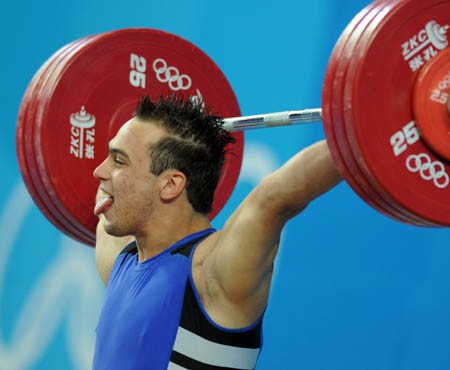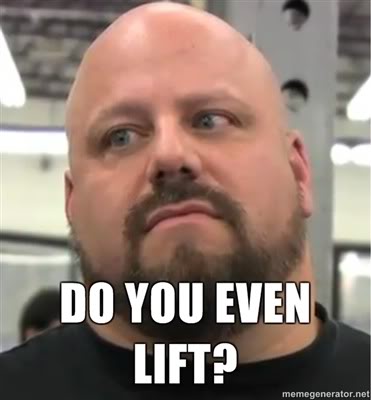Mikhail “Misha” Koklyaev is one of the coolest and most successful strength athletes ever. In his career he has put up impressive performances in strongman, Olympic weightlifting, and powerlifting (the strongman stuff is recorded here).
I’ve always said that we would get along really well with Misha. Need proof? Watch this video of him comically flexing during photos after he won the super heavyweight class at the Russian nationals in 2005. A simple YouTube search will bring up all kinds of impressive athletic performances — like doing a jerk with people on his bar — combined with his trademarked goofy humor and smile. Need more proof? Here’s a video of him lifting a stone while wearing a speedo with Andrey Chemerkin recording:
You’ll note that in the above video, Misha went 200/250 for a 450kg total. Recently he won the Russian Cup with 200/248 despite tweaking something during warm-ups (video below). This led many of us to think, “Does this mean he’ll be going to the Olympics?”
The answer most of us saw online was that the Russian team was not taking him, and it was because of his public admission of PEDs use. The World Anti-Doping Association (WADA) and Olympic committee allegedly only give countries a couple of chances to fail drug tests. The PR storm over allowing a known drug user on the team would have probably made things difficult, and the Russians allegedly were unwilling to risk a positive test since it could remove their weightlifting team from Olympic competition. This seems to be the primary reason, but Russian national team coach David Rigert and Russian Weightlifting Federation president Sergey Syrtsov discuss other points in this translated press conference.
I get the impression that Koklyaev doesn’t get along with the RWF. Perhaps it stems from his admission of drug use? Or maybe it’s that Misha is unwilling to bleed himself dry for the RWF? Misha admits to “quarreling with people” (in the video below), and the Syrtsov says in the press conference that Misha pursued strongman in order to earn more money. If Russian weightlifters fare a quarter as bad as American weightlifters, then you can’t really blame him.
Syrtsov points out that Koklyaev regularly competed internationally as a teen and junior competitor, even besting the 2000 and 2004 gold medal super heavyweight Hossein Rezazadeh as a junior. Yet Syrtsov and Rigert basically come to the point that Misha’s international performance is poor, which effected his Olympic team consideration. They point out that international competition is different than success at home.
Rigert then points out that he coached Misha three times and he lifted up to 30kg lower in the total. Then he weirdly points out how Misha’s wife stopped working for Rigert once she and Misha got together — bitter much, Rigert?
This is a well produced video of Misha’s 2011 Russian Cup victory:
Rigert talks about how Misha was invited and attended training at the national facility. In Rigert’s words, after two weeks Misha just left. Obviously there’s more to the story, and there seems to be an obvious friction between Misha and Rigert, but this was what Rigert told reporters. He then went on to lambaste Misha by saying his eight national championships were all earned when his real competitors were busy preparing for bigger competitions. He’s basically saying, “It’s not that impressive because the real competition wasn’t there.”
Despite all of this, his victory in the Russian Cup made him a candidate for the team. Yet Syrtsov says that the documents they sent Misha were returned in the mail because Misha no longer lived at the address. Then Rigert candidly points out that all of the relevant information — about protocol and what Misha was expected to do — was explained to him. He was subject to a medical examination (i.e. a drug test). Rigert cannot put him on the team if he doesn’t pass this test, and Misha was not present for his test. Rigert then points out that they have two strikes regarding drug tests, implying that if they fail, it doesn’t matter what the circumstances are, they will be removed from Olympic competition. He finishes by basically saying, “Of course I’d want a strong athlete on the team, but not if he can only compete in Russia.”
I’m sure there is more to the story, but it all seems to stem from Misha’s drug use. It must be frustrating for him to go from strongman, a sport that inherently has athletes using PEDs, to a sport like weightlifting where the official committees pretend to stamp out PEDs while most of the athletes use them and don’t get caught. Perhaps Misha has a problem with authority, but he seems to be in good humor in all of his videos. It’s unfortunately clear that politics can decide a guy’s fate. Nevertheless, Misha is still one of the most impressive strength athletes of all time at 34 years old.



 Olympic Champion Andrei Aramnau of Belarus was handed a two-year suspended ban from competition on Friday after driving while intoxicated for the second time in less than three months.
Olympic Champion Andrei Aramnau of Belarus was handed a two-year suspended ban from competition on Friday after driving while intoxicated for the second time in less than three months.